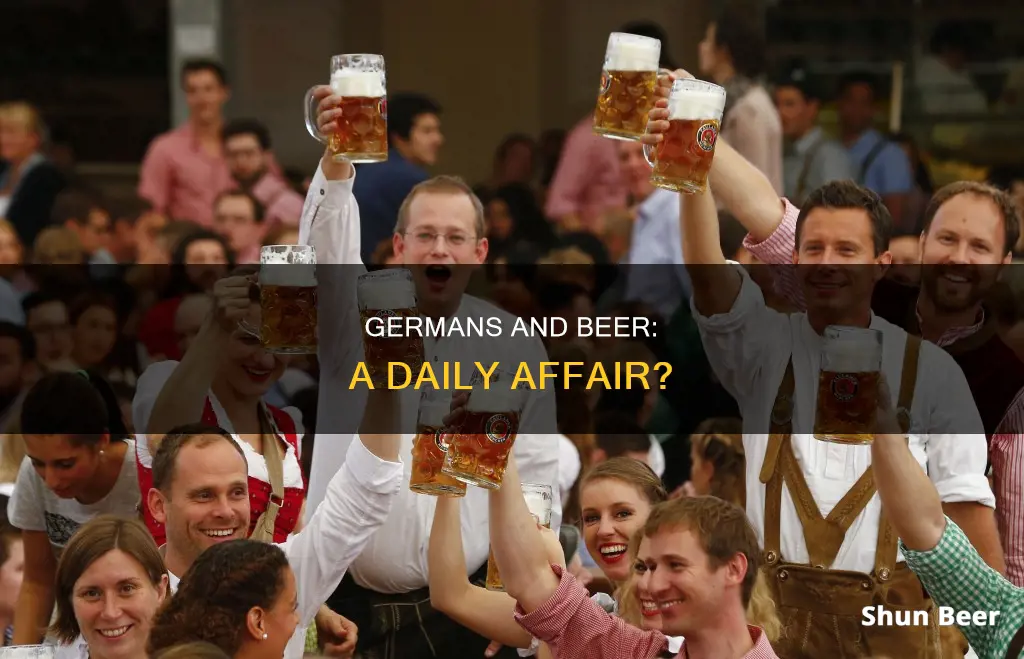
Germany has a strong drinking culture, with beer being the nation's favourite alcoholic beverage. In 2020, the average German drank 95 litres of beer, and in 2018, the average German drank 131.3 litres of alcoholic beverages. While it is not true that all Germans drink beer every day, it is common for Germans to drink beer in the morning, and it is socially acceptable to drink beer with lunch and at any time of the day.
| Characteristics | Values |
|---|---|
| Drinking beer everyday | Some Germans drink beer every day, but this is frowned upon as it is associated with alcoholism. |
| Drinking culture | Germans have a rich culture of beer-drinking traditions, including the "Feierabendbier" (after-work beer) and drinking outdoors in public places. |
| Legal drinking age | Germans are legally allowed to drink beer without adult supervision at 16 and with adult supervision at 14. |
| Beer as a substitute for water | In the past, beer served as a healthy substitute for water, which was usually contaminated. |
| Beer consumption | In 2020, the average German drank 95 litres of beer. |
| Beer varieties | There are around 5,000 different types of beer produced in Germany, with more than half of the breweries located in Bavaria. |
| Purity Law | The German Purity Law, dating back to 1516, regulates the ingredients in beer to water, malt, hops, and yeast. |
| Beer and food | Germans often cook with beer instead of water and drink it with meals. |
What You'll Learn

Germans drank 95 litres of beer per person in 2020
Germany has a long tradition of beer drinking and it is deeply ingrained in their society and customs. Germans have a word, "Feierabendbier", which refers to the tradition of having an after-work beer to end the day. This is particularly popular among blue-collar workers. Beer is also commonly consumed with meals, especially lunch, and is considered a social and enjoyable beverage.
The country boasts around 1,500 breweries, with more than half of them located in the southern state of Bavaria. This diversity of beer producers and styles is unique to the world, with around 5,000 different types of beer available. German brewers adhere to the German Purity Law, which ensures that beer is made with only four ingredients: water, malt, hops, and yeast. This law, dating back to 1516, is the oldest consumer protection law in the world and guarantees the quality of German beer.
While Germans consume a significant amount of beer, it is important to note that consumption levels have been consistently falling since 1990. This could be due to a variety of reasons, including the growing selection of alternative beverages, changes in lifestyle and health choices, and price. Despite this decrease in consumption, Germany remains one of the top beer-consuming countries in Europe, second only to the Czech Republic.
So, while not every German drinks beer every day, the country's love for its diverse and high-quality beer is undeniable, with a long history and cultural significance that continues to be celebrated.
Beer and Fasting: Is It Possible?
You may want to see also

Beer is used for cooking and drinking in the morning
While drinking beer at all hours of the day can be considered normal in Germany, drinking in the morning is a tradition that is particularly tied to Bavaria, a German federal state in the southeast of the country. In Bavaria, it is customary to drink beer before noon, and they even have a specific beer for this time of day called hefeweizen. Hefeweizen is made from malted wheat and has a cloudy, unfiltered appearance. Bavarians don't view beer in the same way as Americans; they don't see it as something that causes laziness or foggy-headedness but rather as part of their diet. In fact, they refer to hefeweizen as "bottled bread".
The tradition of drinking beer in the morning is exemplified by the Bavarian term "Frühschoppen", which refers to the act of drinking an alcoholic beverage before midday in company. This tradition has been part of Bavarian culture for longer than America has existed. While Americans prefer to drink coffee to stay alert during the workday, Bavarians don't see a morning beer as something unusual.
Hefeweizen is commonly consumed during a late morning meal called "brotzeit", which translates to "second breakfast". This meal typically takes place around 11 am and consists of bread, butter, cheese, pickles, veal sausage, mustard, and, of course, hefeweizen.
The drinking of hefeweizen is not limited to brotzeit, however. Bavarians may drink it at any time of day, and it is often consumed alongside a regular breakfast of eggs, assorted oats, and breakfast meats. When Barack Obama attended the 41st G7 summit in Bavaria in 2015, Angela Merkel welcomed him with a full Bavarian breakfast, including hefeweizen. To ensure Obama remained sober for the summit, the beer he was served was non-alcoholic.
Beer is also used in German cooking, sometimes as a substitute for water. It is even said that some Germans drink beer with their cornflakes instead of milk.
Beer and Broken Ribs: Is It Safe to Drink?
You may want to see also

Germany ranks fourth in the world for alcohol consumption
While it is unclear whether or not Germany currently ranks fourth in the world for alcohol consumption, it is evident that alcohol consumption is a prevalent issue in the country. Historical accounts from 1864 suggest that it was not uncommon for Germans to consume the equivalent of 50 cans of beer in a day. While modern consumption patterns may have changed, surveys indicate that a significant proportion of Germans still engage in harmful alcohol consumption, defined as more than 10g of pure alcohol per day for women and more than 20g for men.
According to the German Health Interview and Examination Survey for Adults (DEGS1), 13.1% of women and 18.5% of men aged 18 to 79 consume alcohol in harmful quantities. This prevalence is higher among women with a high socio-economic status and increases with age for men. The per capita consumption of pure alcohol for those aged 15 and above has declined since 1990 but remains above the average of EU member states.
German drinking culture is often associated with beer, and while it is a popular beverage, it is not accurate to assume that all Germans consume beer daily. However, drinking beer is socially acceptable in various settings, such as during lunch or as an "after-work beer." The tradition of "Feierabendbier" involves ending the workday with a glass of beer and is particularly popular among blue-collar workers.
While some individuals may consume beer or alcohol daily, it is important to distinguish between regular consumption and alcohol dependence. Germany has implemented various initiatives and strategies to address harmful alcohol consumption, including preventive measures, health targets, and awareness campaigns. These efforts aim to promote responsible drinking and reduce the negative social and economic consequences associated with alcohol abuse.
Drinking Beer in Saudi Arabia: What's the Deal?
You may want to see also

German beer is perfected and regulated by the 500-year-old Purity Law
The law was originally created to protect citizens from low-quality, potentially toxic substances, and to ensure that wheat crops were reserved for bread-making. It also had a protectionist role, as beers from Northern Germany often contained additives that could not be grown in Bavaria. In addition, the rule excluded problematic methods of preserving beer, such as the use of soot, stinging nettle, and henbane.
The Reinheitsgebot remains influential in German brewing culture, with many brewers still following the original 1516 purity law as it is considered part of the national identity. However, as Germany embraces craft beer, some believe that the law impedes innovation in brewing. There is also a growing sentiment that German beer is not as good as it used to be, with consumers noting that many brands taste the same and that award-winning beers now come from countries like the US.
Despite these criticisms, the Reinheitsgebot continues to shape brewing not only in Germany but around the world. It is considered a valuable marketing tool, with German brewers using the law to market their beer internationally and some breweries outside of Germany voluntarily adhering to the Reinheitsgebot. The law has also influenced other countries' brewing regulations, such as Greece, which formally incorporated the Reinheitsgebot into its own laws.
In conclusion, German beer is perfected and regulated by the 500-year-old Purity Law, which has evolved over time to balance tradition, innovation, and consumer safety. While some argue that the law restricts brewing creativity, others view it as a cornerstone of German culture and a guarantee of quality.
Beer and Suboxone: Is It Safe to Mix?
You may want to see also

Germans drink less than they used to
While beer is the favourite alcoholic beverage of Germans, they are drinking less than they used to. In 2018, the average German drank 131.3 litres of alcoholic beverages, down from 10.6 litres per person in 2016. In 2020, this figure dropped further to 95 litres per person.
This decrease in alcohol consumption is in line with global trends. According to the World Health Organization, Europe drinks more alcohol than the global average, but consumption rates are declining.
Historically, Germans drank astonishing amounts of beer. In 1864, a correspondent for The Atlantic reported that it was not uncommon for Germans to drink the equivalent of 50 cans of beer in a day. The correspondent also observed that, despite the high levels of alcohol consumption, Munich society functioned well.
Today, drinking in the morning is still somewhat normalised in Germany. It is not uncommon to see people drinking beer as early as 6:30 am, and labourers drinking while waiting for the tram on their way to early shifts. However, medical advice has evolved to recognise the strong link between alcohol abuse and certain types of cancer, leading to a shift in cultural attitudes towards drinking.
While Germans still drink a significant amount of alcohol, they are consuming less than they used to, reflecting a growing awareness of the health risks associated with excessive alcohol consumption.
Drinking Beer at Solomon's Island Boat Ramp: Is it Allowed?
You may want to see also
Frequently asked questions
While it is not uncommon for Germans to drink beer every day, doing so is generally frowned upon and can be a sign of alcohol addiction.
According to a study by the German Center for Addiction Issues (DHS), Germans drank an average of 131.3 litres of alcoholic beverages in 2018. This is equivalent to about a bathtub full of beer, wine, sparkling wine, and spirits per person per year.
While drinking beer in the morning may be normal for some Germans, it is not the norm. However, during Carnival, a season of drunken revelry, drinking beer at all hours becomes more acceptable.







